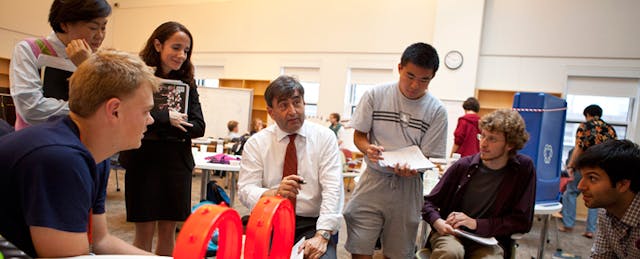When it comes to celebrating academia, two prestigious awards--the Nobel Prize and MacArthur Genius Grants--typically come to mind. They recognize those whose research has contributed significant knowledge to their field.
Academics have another responsibility, too: to teach and inspire students. But so far, there’s been nothing as prestigious or financially generous for teaching. The Carnegie Foundation’s “U.S. Professors of the Year” program awards $5,000 to four recipients each year, but that’s a paltry sum compared the to $1.1 million for Nobel winners, or the $500,000 for MacArthur Geniuses.
That’s about to change. Today, the Minerva Project announced that the first Minerva Prize for Advancements in Education--which comes with a $500K check--will be awarded to Dr. Eric Mazur, the Balkanski Professor of Physics and Applied Physics and Area Dean for Applied Physics at Harvard University. (The company did not disclose the number of nominations received.)
Mazur is credited with introducing a teaching style, “Peer Instruction,” in the early 1990s. The pedagogy may seem rudimentary--even obvious by today's knowledge: “You teach by questioning rather than telling,” Mazur explains to EdSurge. “You ask a question. Students first answer individually, then deliberate as a group about which answer is correct.”
However, at a time when lectures dominated the class (and many would argue they still do today), Mazur’s style proved to be effective.
“Students can teach something that they just recently learned because the memory of being confused is still fresh,” Mazur says. By contrast, professors sometimes have the “curse of knowledge,” an idea he attributes to Harvard psychology professor, Steven Pinker. “The more you understand something, the harder it becomes to imagine what it’s like to be a beginning learner.”
Nearly 1,500 academic articles on Peer Instruction have been published. Mazur also published a book named after this teaching methodology, which has been translated into four languages.
“What we all find so exciting about Mazur’s work is that he shows how crucial the faculty role is in monitoring and fostering student achievement,” says Dr. Jennifer Summit, Professor of English at Stanford University and a Minerva Academy member who participated in the award process.
Mazur used his ideas to build a product as well. In 2011 he co-founded Learning Catalytics, which developed an assessment platform that tracks students’ understanding of class material in real time through the use of mobile devices (think clickers). The company was acquired by Pearson in April 2013.
Despite this entrepreneurial venture, Mazur remains “skeptical about the use of technology in education,” particularly when it comes to online learning. “I’ve never been particularly fond of the whole MOOCs movement,” Mazur states. “I’ve been openly critical about it. When you put people in front of a screen to watch somebody talk, they turn into a passive observer.”
Prior to being nominated for the award, Mazur was inducted into the Minerva Academy, an honorary group organized by The Minerva Project to highlight exemplars of higher education teaching. (The group does not consult or advise the Minerva Project, and Mazur was not involved in the awards process.) He admits that he “went in [to Minerva’s SF office] with a healthy dose of skepticism.” But after learning more about the program and curriculum, he is convinced that Minerva “can integrate [the Peer Learning pedagogy] into its online platform” and “focus on student interaction and not just delivery of information.”
Mazur says he is “incredibly honored, flattered and humbled” by the award. “I’ve always taken the job of research in physics very seriously. At the same time we have a moral obligation to educate each other and the public at large,” he says. “We need to have a public that is scientifically literate. Otherwise, how can you expect people to understand your research?”


